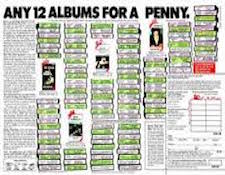It’s the time of year for saving money!
I must have been about sixteen, if memory serves, when one day while looking at a magazine, I saw an advertisement claiming “twelve albums for one cent! I could hardly believe my eyes. How could this be? How can any company sell so much music for so little? Obviously, I didn’t read the fine print.
 Columbia House Record Club was very popular in the 1970’s (and probably earlier). Several of my friends and I willingly and eagerly taped a penny to the little circle on the ad, cut it out of the magazine and mailed it back. Soon enough we received our albums in the mail. We played them to our hearts content and had so much fun listening to all our different albums at each other houses. Of course we didn’t read the fine print. Had we done so, we’d have known there was a catch.
Columbia House Record Club was very popular in the 1970’s (and probably earlier). Several of my friends and I willingly and eagerly taped a penny to the little circle on the ad, cut it out of the magazine and mailed it back. Soon enough we received our albums in the mail. We played them to our hearts content and had so much fun listening to all our different albums at each other houses. Of course we didn’t read the fine print. Had we done so, we’d have known there was a catch.
When I got the first letter with a catalog of available albums, and advertising one as the recording of the month, I paid only casual attention to the card that had to be mailed back. On this card, you could accept the selection of the month or reject it but either way; you had to return the card or you’d get the album automatically. I asked my Mom for a stamp, checked the box indicating no purchase at this time, and mailed the thing back. As far as I was concerned, I was finished with Columbia House. It wasn’t so long afterwards the threats started.
When I failed to purchase, I don’t remember, five or ten albums at the regular club price within, what thirty, sixty days (?), I received a letter that was not nearly as nice as the original advertisement. When I finally out of fear showed the letter to my Dad, well, he was less than enthused with me. I don’t remember how I got out of the mess in which I found myself, but somehow I managed to fulfill the purchase agreement and promptly canceled the membership.
Some years later, I guess it was in the mid 1980’s, for some reason, I joined again. This time, however, I remained a member for about five years. And once I got to some exalted membership level, I started receiving offers for buy one, get three, sometimes four for free – something I took advantage of quite often. Had I done the math, I would have probably discovered that I really wasn’t saving any money.
 Columbia House employed the classic sales technique of a lost leader. They took the initial hit on selling you twelve albums (or later CD’s) for a penny because they knew that once you fulfilled the membership agreement, you would have repaid the free ones and more. Way more in fact.
Columbia House employed the classic sales technique of a lost leader. They took the initial hit on selling you twelve albums (or later CD’s) for a penny because they knew that once you fulfilled the membership agreement, you would have repaid the free ones and more. Way more in fact.
By the time you paid the “normal club price” that was what, twenty or more percent higher than what could be bought in a store, then paid the shipping and “handling” (I’ve always found “handling” completely ridiculous), your final purchase cost was almost double what you could get locally at a normal resale price, never mind a sale price. I suppose the hook was that one word they kept bandying about – FREE!
Yet despite all this, I remained a loyal member. When you get a buy one, get three for free it’s a hard thing to just not go for it. I must have, at some point, realized it wasn’t such a great deal, but such knowledge did little to thwart continued orders. I could buy music, get it sent to my house and I never had to leave home. Call it online buying before there was an online.
One of the main problems with Columbia House, and the reason I eventually canceled my membership, was the lack of music. I found myself buying music I really didn’t want just because I absolutely had to take advantage of four CD’s for, what, $30.00? I wound up with quite a lot of music I listened to only once and never again. I eventually moved all of them to my storage room in a box. And when the time came for computer audio, I didn’t bother to get them or think about burning them to a hard drive. Because by the time computer audio was popularized, I had long since forgotten about Columbia House.
I reminisce about this because I recently read where Columbia House had filed for Bankruptcy protection. Several years ago, they ended sales of music and were instead exclusively selling DVD’s. With the advent of companies like Netflix and Amazon, and the increasingly popular streaming movies online, the sales model Columbia House had so long employed had run its inevitable course. Times had changed, people’s buying habits had changed, and the way in which Columbia did business was no longer held in favor.
![]() Unless I am mistaken, a “membership” music outlet with specific and dated purchase requirements no longer exists. With the Internet, consumers have the ability to purchase music from around the world or stream if that preference better suits listening habits. I’ve tried to imagine a business plan where such a selling methodology would work in modern times but I fail to do so. Maybe Columbia House will rise from the ashes, maybe they won’t. Maybe there will be far fewer sixteen year old kids receiving lawyer looking, threatening letters that they are too afraid to show their parents.
Unless I am mistaken, a “membership” music outlet with specific and dated purchase requirements no longer exists. With the Internet, consumers have the ability to purchase music from around the world or stream if that preference better suits listening habits. I’ve tried to imagine a business plan where such a selling methodology would work in modern times but I fail to do so. Maybe Columbia House will rise from the ashes, maybe they won’t. Maybe there will be far fewer sixteen year old kids receiving lawyer looking, threatening letters that they are too afraid to show their parents.
I suppose in some perverse sense, I look back on my days with Columbia House with favorable memories. It was, to a certain extent, an exciting thing to think you were “cheatin the man” because you were getting something for free. I’m also glad I don’t have to be forced to buy music simply because another month has rolled by. Because in all honestly, I find it way too easy to spend money for music all on my own without any help or provocation from anyone. I’m just as much my own worst enemy then as now. Unlike then, today I have the freedom to purchase music I most enjoy and at the time and cost I decide is best for me. I’m no longer bound by a membership and what is charitably an archaic method of doing business. Unless of course Amazon has a four for one special – I’m definitely there for that one.





